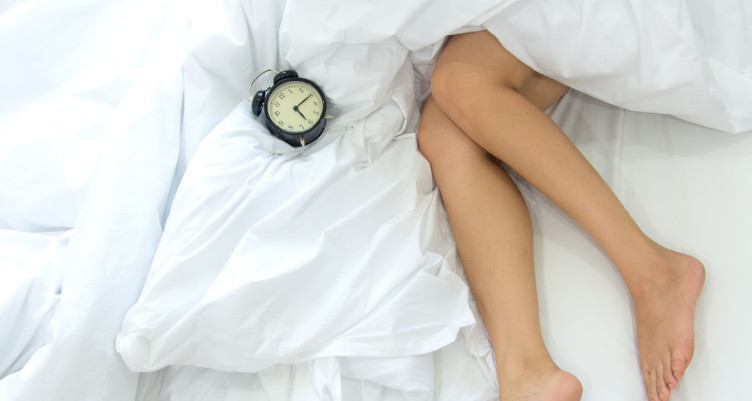Sleep Hacking: Reboot Your Sleep & Fall Asleep Fast

Insomnia is a major problem for many high-performing type-A entrepreneurs. Some insomniacs can’t fall asleep, and some can’t stay asleep. Neither of those is a problem for me anymore (at least that I’m aware of; my Sleep Cycle app will verify if I’m waking up without knowing it). I used to have real problems falling asleep because I’d rehash the day’s events in my mind or dwell on upcoming stuff.
This post is full of info on how to hack your sleep so that you can fall sleep more easily and sleep more in less time while staying healthy that I based on years of self-experimenting, research, and biohacking:
Unhacked sleep sucks. It takes forever, about 40% of your life if you sleep as much as your body will let you without an alarm clock (or two young kids in my case…) If you cut sleep down to only 20% of your life, you will still sleep about 5 hours a night. Assuming you plan to live to be 80, cutting sleep to 5 hours is like gaining 16 YEARS of waking life, equivalent to about 20 years of life including sleep and wake cycles. That’s enough to get FIVE PhDs, to have another career, to have sex, to play with your kids, or even to watch reruns of Gilligan’s Island – if that’s your thing.
Optimizing sleep really works. I’ve been fortunate to have far more experience than my 38 years would normally allow, including time running strategy for two billion-dollar companies, having 3 of my companies acquired, writing a book, working for a VC, advising dozens of startups, running a nonprofit, etc. One reason is that I sleep less. I’ve had an extra EIGHT YEARS in the first half of my life (or maybe 5 extra years if you assume I spent the first 18 years going to school). In any case, my career so far looks like that of someone in their mid-40’s, and I expect it will look even better when I’m actually in my mid-40’s.
This disparity is why we’re all sleep deprived. Proper sleep is wonderful, rejuvenating, and profound dreams are a part of what makes life interesting. It is possible to reap all the benefits of sleep in less time. Insomnia is awful. Nothing sucks more than setting aside time to sleep, then not even getting that done.
First, let’s tackle problems with falling asleep. If you can’t fall asleep, there are only three reasons for it. The first is simply not being tired. The second is having distractions, which come in many forms, all of which are hackable. The last is that you have a biological problem – a hardware problem in hacker-speak – that needs medical attention, like sleep apnea.
In my world, sleep is a conscious act, and rarely an inevitable thing that just happens. You can do things to make sure you’re tired when you decide to go to sleep.
To make yourself tired, there are things to avoid before sleep and there are supplements, drugs, environment, and food hacks you should use. Here is a list of things to avoid to help you sleep better. Look for more biohacking technology and supplements in the next couple posts.
Getting Sleepy Step 1: Avoid stuff
· Avoid bright lights for at least a half hour before bed. Dim your office lights, and consider replacing the unhealthy florescent ones with warm-tone LEDs. Install f.lux on your PC to automatically dim the screen based on day/night cycles. Don’t stare at your TV, iphone or ipad until you’ve dimmed it all the way either – white light is not your friend at night because even 5 minutes of it shuts off your melatonin production.
If it affects you, graphic TV violence may make it harder to sleep.
Don’t exercise 2 hours before bed, at least.
Coffee, green tea, and chocolate, sometimes even before lunch, may affect sleep. Track them and measure them to see if it’s a problem.
·Take plant-sourced, physiological melatonin and L-ornithine 30 minutes before bed. Physiological doses of melatonin are different than the much more common pharmacological doses (1-10mg) on the market, which cause unnaturally elevated levels the next day and can negatively impact your body’s natural products. That’s why I use Sleep Mode, which contains plant-sourced melatonin (one of the only ones on the market) in a physiological dose of 0.3mg (300mcg). It also contains a science-backed dose of L-ornithine, which has been shown to reduce feelings of stress and improve sleep efficiency.
· Hit the sack before 11pm. There is a window between 10:45 and 11pm when you get tired. If you miss it, you get a cortisol-driven “second wind” that lets you be productive until 2am, or keeps you awake until then. You also get better sleep from hitting the before-11pm window, and wake up feeling more rested than getting the same amount of sleep starting later and sleeping in. (I use biohacking tools to ignore this rule, but I may pay for it someday).
Note that all of these can be used in reverse to keep yourself up later, if you so choose.



